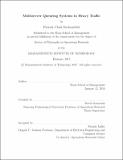Multiserver queueing systems in heavy traffic
Author(s)
Eschenfeldt, Patrick Clark
DownloadFull printable version (767.3Kb)
Other Contributors
Massachusetts Institute of Technology. Operations Research Center.
Advisor
David Gamarnik.
Terms of use
Metadata
Show full item recordAbstract
In the study of queueing systems, a question of significant current interest is that of large scale behavior, where the size of the system increases without bound. This regime has becoming increasingly relevant with the rise of massive distributed systems like server farms, call centers, and health care management systems. To minimize underutilization of resources, the specific large scale regime of most interest is one in which the work to be done increases as processing capability increases. In this thesis, we characterize the behavior of two such large scale queueing systems. In the first part of the thesis we consider a Join the Shortest Queue (JSQ) policy in the so-called Halfin-Whitt heavy traffic regime. We establish that a scaled process counting the number of idle servers and queues of length two weakly converges to a two-dimensional reflected Ornstein-Uhlenbeck process, while processes counting longer queues converge to a deterministic system decaying to zero in constant time. This limiting system is similar to that of the traditional Halfin-Whitt model in its basic performance measures, but there are key differences in the queueing behavior of the JSQ model. In particular, only a vanishing fraction of customers will have to wait, but those who do will incur a constant order waiting time. In the second part of the thesis we consider a widely studied so-called "supermarket model" in which arriving customers join the shortest of d randomly selected queues. Assuming rate n[lambda]n Poisson arrivals and rate 1 exponentially distributed service times, our heavy traffic regime is described by [lambda]n 1 as n --> [infinity]. We give a simple expectation argument establishing that queues have steady state length at least i* = logd 1/1-[lambda]n with probability approaching one as n [infinity] 8. Our main result for this system concerns the detailed behavior of queues with length smaller than i*. Assuming [lambda]n converges to 1 at rate at most [square root of]n, we show that the dynamics of such queues does not follow a diffusion process, as is typical for queueing systems in heavy traffic, but is described instead by a deterministic infinite system of linear differential equations, after an appropriate rescaling.
Description
Thesis: Ph. D., Massachusetts Institute of Technology, Sloan School of Management, Operations Research Center, 2017. This electronic version was submitted by the student author. The certified thesis is available in the Institute Archives and Special Collections. Cataloged from student-submitted PDF version of thesis. Includes bibliographical references (pages 107-109).
Date issued
2017Department
Massachusetts Institute of Technology. Operations Research Center; Sloan School of ManagementPublisher
Massachusetts Institute of Technology
Keywords
Operations Research Center.